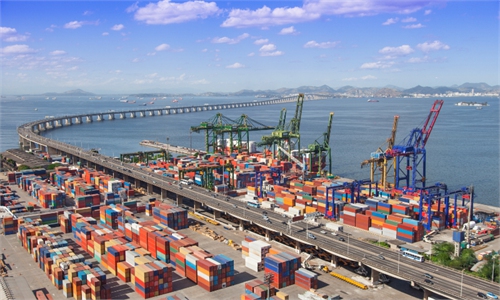
A view of a farmland in Ohio, US. Photo: VCG
The latest financial reports of multiple US agricultural businesses showed weakened market performance, as the US government's tariff hikes backfired on trade of agricultural products, lifting costs for purchasing agricultural machinery and materials.
US President Donald Trump's "reciprocal tariffs" compressed the export profits of US farmers and raised production costs for agricultural machinery, fertilizers and pesticides, which rely more on imported parts or raw chemicals, and will potentially harm one of the country's competitive industries, Hu Qimu, a deputy secretary-general of the Digital-Real Economies Integration Forum 50, told the Global Times on Sunday.
American agricultural product trader ADM reported $159 million of operating profit for its agricultural services segment in the first quarter of 2025, with a 31 percent year-on-year decline, attributing the decrease in volumes and margins primarily due to tariff and trade policy uncertainty. The figures were contained in its financial report released on May 6.
Another US grain trader and processor Bunge announced a decline. Its financial report for the first quarter of 2025 showed that the adjusted earnings before interest and taxes of the agribusiness segment dropped by nearly 45 percent year-on-year to $268 million, while the segment was the largest in terms of revenue and sales.
"The first quarter exceeded our expectations, driven in part by some pull forward of activity from the second quarter into the first quarter," said CEO Greg Heckman during an earnings call on May 7. "Shifting trade dynamics, including tariffs and regulatory uncertainty, prompted some farmers and consumers to act ahead of potential changes."
Amid widespread opposition, Trump on April 2 signed an executive order on so-called "reciprocal tariffs," imposing a 10-percent "minimum baseline tariff" and higher rates on certain trading partners, the Xinhua News Agency reported.
"A 10-percent tariff currently applies to most phosphate imported into the United States, and vessels were diverted to other countries, causing imports to track below last year," US fertilizer and pesticide company Mosaic Co said on May 6 in its financial report for the first quarter of 2025. Phosphate is a key crop nourishing ingredient.
Nutrient, a US-based crop inputs and services company, recorded a 21.6-percent year-on-year decrease in the quarterly net selling price for potash in North America, and a 16-percent year-on-year decrease of adjusted earnings of total potash sales, its financial report showed.
As part of the US pesticide industry relies on some supplies from tariff-hit countries such as China and India, more US farmers are expected to face increasing costs, and Nutrient is planning a price increase of its branded products of 5 percent to 7.5 percent.
Jeff Tarsi, an executive of Nutrient, said that "we're going to see price increases. Our plan is to pass those price increases through to our customers."
Increasing crop planting costs in the US constrained sales of agricultural machinery. US agricultural machinery company AGCO reported significant inflation in costs like parts, shipping and energy, and mostly offset them through price increases. In the first quarter, net sales hit $2.1 billion, a year-on-year drop of 30 percent. The company noted that recent announcements of significant trade policy and tariff actions by the US government created significant uncertainty and potential risks for the business.
China and the US kicked off on Saturday a high-level meeting on economic and trade affairs in Geneva, Switzerland. Yuyuantantian, a social media account affiliated with state broadcaster CCTV, reported on Saturday that China had moved to accelerate the replacement of US products before the meeting.
In April, China signed contracts to purchase at least 2.4 million tons of soybeans from Brazil—a volume equivalent to nearly one-third of China's average monthly soybean imports, the Yuyuantantian report said.
The Chinese market is huge and full of business opportunities for US farmers, Li Guoxiang, a research fellow at the Rural Development Institute of the Chinese Academy of Social Sciences, told the Global Times on Sunday, while noting that China is reinforcing the resilience of its agricultural product supplies and diversifying its import channels, and US agricultural products are losing competitiveness amid tariffs.



